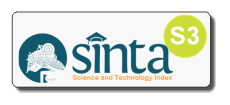Suppression Sebagai Mediator Peranan Emotional Job Demand Terhadap Teacher Well-Being
Abstract
Full Text:
PDF (Bahasa Indonesia)References
Acton, R., & Glasgow, P. (2015). Teacher wellbeing in neoliberal contexts: A review of the literature. Australian Journal of Teacher Education, 40(8), 99–114. https://doi.org/10.14221/ajte.2015v40n8.6
Affandi, A. (2016). DAMPAK PEMBERLAKUAN UNDANG-UNDANG. Hukum Samudra Keadilan, 11, 196–208.
Bakker, A. B., & Demerouti, E. (2007). The Job Demands-Resources model : state of the art. Journal of Manajerial Psychology. 22(3), 309–328. https://doi.org/10.1108/02683940710733115
Bakker, A. B., & Demerouti, E. (2014). Job Demands – Resources Theory. Work and Wellbeing: Wellbeing: A Complete Reference Guide Volume III. 1–28.
Beaton, D. E., Bombardier, C., Guillemin, F., & Ferraz, M. B. (2000). Guidelines for the process of cross-cultural adaptation of self-report measures. Spine, 57(24), 3186–3191. https://doi.org/10.1080/000163599428823https://doi.org/10.1002/9781118539415.wbwell019
Benevene, P., Wong, YHP., Fiorilli, C., & Stasio, S. De. (2018). A Cross-National Comparison on Subjective Well-Being of Kindergarten Teachers : Hong Kong and Italy. 9(December). Brief Research Report. 1–6. https://doi.org/10.3389/fpsyg.2018.02626
Butler, E. A., Lee, T. L., & Gross, J. J. (2009). Does Expressing Your Emotions Raise or Lower Your Blood Pressure?. Journal of Cross-Cultural Psychology, 40 (3), 510–517. https://doi.org/ 10.1177/0022022109332845
Chang, M. (2009). An Appraisal Perspective of Teacher Burnout : Examining the Emotional Work of Teachers. Educ Psychol Rev. 21, 193–218. https://doi.org/10.1007/s10648-009-9106-y
Clunies‐Ross, P., Little, E., & Kienhuis, M. (2008). Self-reported and actual use of proactive and reactive classroom management strategies and their relationship with teacher stress and student behaviour. Educational Psychology, 28, 693–710.
Collie, R. J., Shapka, J. D., & Perry, N. E. (2012). School Climate and Social – Emotional Learning : Predicting Teacher Stress , Job Satisfaction , and Teaching Efficacy. Journal of Educational Psychology. 104(4), 1189–1204. https://doi.org/10.1037/a0029356
McCallum, F., Price, D., Graham, A., & Morrison, A. (2017). Teacher Well-Being: A review of the literature. NSW, The University of Adelaide, Australia. https://doi.org/10.4324/9780203465400
Ford, B. Q., Mauss, I. B., & Gruber, J. (2015). Valuing Happiness Is Associated With Bipolar Disorder. Emotion 15(2), 211–222. ttps://doi.org/10.1037/emo0000048
Gore, J. S., & Cross, S. E. (2010). Relational Self-construal Moderates the Link between Goal Coherence and Well-being. Self and Identity. 9, 41–61. https://doi.org/10.1080/15298860802605861
Grandey, A. A. (2000). Emotion Regulation in the Workplace : A New Way to Conceptualize Emotional Labor. Journal Occupational Health Psychology. 5(1), 95–110. https://doi.org/10.1037//1076-8998.S.1.9S
Gross, E., Sevier, C. S., Heldman, N., Vitu, E., Bentzur, M., Kaiser, C. A., Thorpe, C., & Fass, D. (2005). Generating disulfides enzymatically : Reaction products and electron acceptors of the endoplasmic reticulum thiol oxidase Ero1p. National Academy of Sciences of the USA. 103(2), 299-304. www.pnas.org/cgi/doi/10.1073/pnas.0506448103
Gross, J. J. (1998). Antecedent- and Response-Focused Emotion Regulation : Divergent Consequences for Experience , Expression , and Physiology. Journal of Personality and SOcial Psychology. 74(1), 224–237.
Gross, J. J., & John, O. P. (2003). Individual differences in two emotion regulation processes Implications for affect, relationships, and well-being. Journal of Personality and Social Psychology,.pdf. (n.d.).
Hakanen, J. J., Bakker, A. B., & Schaufeli, W. B. (2006). Burnout and work engagement among teachers. Jorunal of Achool Psychology. 43, 495–513. https://doi.org/10.1016/j.jsp.2005.11.001
Hayes, A. (2018). Introduction to mediation, moderation, and conditional process analysis. New York: The Guilford Press.
Harmaini. (2011). Psikologi lintas budaya. Pekanbaru: Almujtahadah Press.
Horn, J. E., Taris, T. W., Schaufeli, W. B., & Schreurs, P. J. G. (2004). The structure of occupational well-being_A study among Dutch teachers. Journal of Occupational and Organizational Psychology. 77, 365-375.
Hornik, S. R., Denoyelles, A., Dixon, K.G., & Johnson, R. D. (2014). Exploring the Dimensions of Self-Efficacy in Virtual World Learning : Environment , Task , and Content. Learning and Teaching. 10(2), 255–271.
Huang, S., Yin, H., & Lv, L. (2019). Job characteristics and teacher well-being: the mediation of teacher self-monitoring and teacher self-efficacy. Educational Psychology, 39(3), 313–331. https://doi.org/10.1080/01443410.2018.1543855
Jonge, J. De, & Dollard, M. F. (2001). Testing reciprocal relationships between job characteristics and psychological well-being : A cross-lagged structural equation model. Journal Of Occupational and Organizational Psychology. 7, 29–46.
Jonge, J. De, & Dormann, C. (2006). Stressors , Resources , and Strain at Work : A Longitudinal Test of the Triple-Match Principle. Journal of Applied Psychology. 91(5), 1359–1374. https://doi.org/10.1037/0021-9010.91.5.1359
Jonge, J. De, Le, P. M., Peeters, M. C. W., & Noordam, H. (2008). Emotional job demands and the role of matching job resources : A cross-sectional survey study among health care workers. International journal of Nursing studies . 45, 1460–1469. https://doi.org/10.1016/j.ijnurstu.2007.11.002
Klassen, R. M., & Ming, M. (2011). The occupational commitment and intention to quit of practicing and pre-service teachers : Influence of self-efficacy , job stress , and teaching context. Contemporary Educational Psychology, 36(2), 114–129. https://doi.org/10.1016/j.cedpsych.2011.01.002
Krause, N., Dasinger, L. K., & Neuhauser, F. (1998). Modified Work and Return to Work : A Review of the Literature. Journal of Occupational Rehabilitation, 8(2), 113-139.
Markus, H. R., & Kitayama, S. (2010). Cultures and Selves : A Cycle of Mutual Constitution. 420–430. https://doi.org/10.1177/1745691610375557
Matsumoto, D. (1993). Ethnic Differences in Affect Intensity , Emotion Judgments , Display Rule Attitudes , and Self-Reported Emotional Expression in an American Samplel. 17(2), 107–123.
Mohammad Surya. (2004). Psikologi pembelajaran dan pengajaran. Bandung: Pustaka Bani Quraisy.
Ryan, R. M., & Deci, E. L. (2011). A Self-Determination Theory Perspective on Social , Institutional , Cultural , and Economic Supports for Autonomy and Their Importance for Well-Being. Human Autonomy in Cross-Cultural Context. 45–64. https://doi.org/10.1007/978-90-481-9667-8
Soto, A., Perez, C. R., Kim, Y., Lee, E. A., & Minnick, M. R. (2011). Is Expressive Suppression Always Associated With Poorer Psychological Functioning ? A Cross-Cultural Comparison Between European Americans and Hong Kong Chinese. Emotion. 11(6), 1450–1455. https://doi.org/10.1037/a0023340
Suseno, Frans Magnis. (1993). Etika Jawa : Sebuah analisis falsafi kebijaksanaan hidup Jawa. Jakarta: Gramedia. (pp. 257–264).
Sutton, R. E., & Harper, E. M. (2009). Teachers’ emotion regulation. In International Handbook of Research on Teachers and Teaching (pp. 389–401). Springer.
Webster, J. R., Beehr, T. A., & Christiansen, N. D. (2010). Toward a better understanding of the effects of hindrance and challenge stressors on work behavior q. Journal of Vocational Behavior, 76(1), 68–77. https://doi.org/10.1016/j.jvb.2009.06.012
Wong, C., & Law, K. S. (2002). The effects of leader and follower emotional intelligence on performance and attitude : An exploratory study. The Leadership Quarterly, 13, 243-274.
Yin, Hong-biao, & Lee, J. C. (2012). Be passionate , but be rational as well : Emotional rules for Chinese teachers ’ work. Teaching and Teacher Education, 28(1), 56–65. https://doi.org/10.1016/j.tate.2011.08.005
Yin, Hongbiao. (2015). Teachers and Teaching : theory and practice The effect of teachers ’ emotional labour on teaching satisfaction : moderation of emotional intelligence. March, 37–41. https://doi.org/10.1080/13540602.2014.995482
Yin, Hongbiao, Huang, S., & Lv, L. (2018). A multilevel analysis of job characteristics, emotion regulation, and teacher well-being: A Job Demands-Resources Model. Frontiers in Psychology, 9(NOV), 1–13. https://doi.org/10.3389/fpsyg.2018.02395
Yin, Hongbiao, Huang, S., & Wang, W. (2016a). Work Environment Characteristics and Teacher Well-Being : The Mediation of Emotion Regulation Strategies. International Journal of Environmental Research and Public Health. 13(9), 1-16. https://doi.org/10.3390/ijerph13090907
Yin, Hongbiao, Huang, S., & Wang, W. (2016b). Work environment characteristics and teacher well-being: The mediation of emotion regulation strategies. International Journal of Environmental Research and Public Health, 13(9). https://doi.org/10.3390/ijerph13090907
Zulkifli, M., Darmawan, A., & Sutrisno, E. (2014). Motivasi kerja, sertifikasi, kesejahteraan. Jurnal Psikologi Indonesia, 3(02), 148–155.
DOI: http://dx.doi.org/10.17977/um023v10i12021p55-65
Refbacks
- There are currently no refbacks.
Copyright (c) 2021 Jurnal Sains Psikologi

This work is licensed under a Creative Commons Attribution 4.0 International License.
Reference Manager :
|
Aliansi:
Plagiarism Checker :
This work is licensed under a Creative Commons Attribution 4.0 International License.



1.png)








